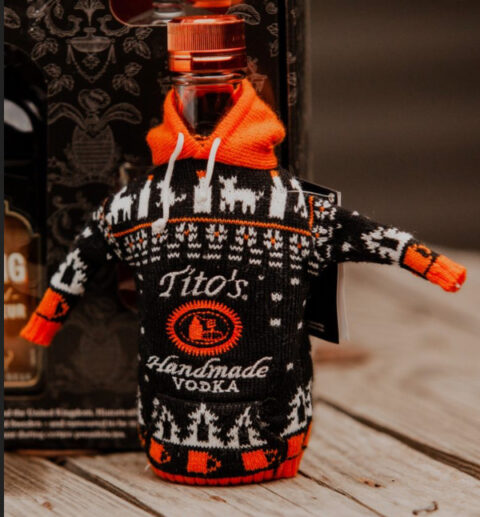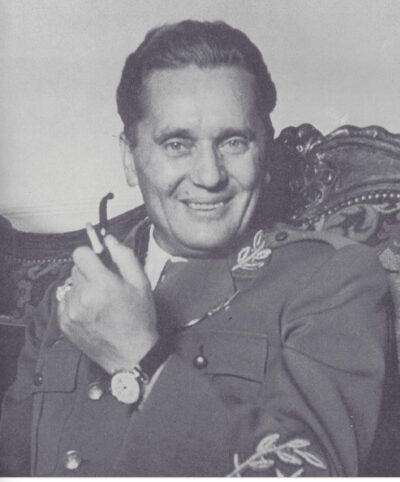Christmas With Tito

As you know, there has been another war in Eastern Europe going on for over ten months now. I was a remote participant in the one before that, and our pal Mac Showers had been there for one of the key moments in post-World War II history. I was writing a book on Mac’s remarkable career at the time, summarizing our weekly meetings at the famed Willow Restaurant in Arlington to talk about the times he thought most significant. We had started with the famous stuff and the War in the Pacific against Japan. It took a couple years to do it all, and much of it was already in the history books. The events that came after were new territory.
One holiday afternoon in 2007, I asked about Korea and the war there and he shook his head. “I was at CINCNELM in London for that. We had some interesting times back there at Ike’s old HQ on North Audley Street. In December 1951, the U.S. Sixth Fleet flagship (Admiral Gardner & Staff embarked) was suddenly approved to make the Navy’s first official visit to Yugoslavia after WWII. The announcement was exported in formal Navy communications. He reached into his folder and pulled out a copy of official correspondence:
Vice Admiral Matthias Bennett Gardner, commander of the United States Sixth Fleet, will arrive Monday in the port of Fiume (Rijeka) aboard his flagship, the 17,000-ton heavy cruiser Des Moines, on the first American naval visit to Yugoslav waters since the end of World War II. The visit will last four days.
Mac looked over the rim of his Virgin Mary cocktail- he had an oncologist visit that week and was temporarily on the wagon – and put down the old paper on top of the folder he brought to talk about holidays in the Old Navy.
He started with a smile that matched our holiday mood. “Naturally this was a big deal for the Fleet Commander. To augment the Sixth Flt intelligence capability for this occasion, LT Art Newell and I were ordered from our shop at CINCNELM in London to embark on the flagship.”
I nodded at the unfamiliar name for the command, a product of the stand-up of US Forces in Europe. The Admiral in London had responsibility for maritime operations in the regional command structure. Then I asked what the Christmas season was like there, only six years after the conclusion of World War II.
Mac looked off across the bar at Liz-With-an-S who was working energetically to keep the drinks on the bar well stocked. His eyes softened. “Belgrade is now in Serbia, and that is the flavor of the holidays. They tell stories around the fire, at the mills, or on long journeys. They prefer wonder tales, or tales of magic. They normally feature a hero or heroine who takes on an impossible task. The stories feature aid given by wondrous creatures, and a happy marriage is often the end result. The stories feature unlikely heroes. They are not the most clever but certainly the most good. Serbian fairy tales are naturally rooted in Slavic traditions, but they have a unique flavor. They combine a mix of Christian and Islamic ideals that are woven into Yugoslavian folklore. That means they have a Greek heritage as well. All elements of the various cultures that have called it home.”

(USS Des Moines (CA-134) underway in the Med, 1951).
“We pulled into Rijeka for the big visit. Tito used to keep his yacht moored there, and it was a nice port city the Italians had run under the name “Fiume.” While we were there, ADM Gardner was invited by Marshal Tito to fly into Belgrade for a meeting. He could be accompanied by up to three staff officers. The Sixth Fleet Intelligence officer, CDR Fred Welden, graciously nominated me to go along as the intel rep.
“In Belgrade, once the sedans whisked us away from the airport, there was the official call on the U.S. Ambassador and the Chief of Mission, all of it leading up to the big lunch with the Marshal himself.”
“The situation in Belgrade was tense, and the Informbiro crisis about the Tito-Stalin split in 1948 still reverberated as a threat to the regime. Tito was under intense pressure from Stalin to toe the Moscow line, and he was not going to do it. He was confronted with the threat of invasion, or assassination, and he desperately needed a card to play against the Kremlin. The US Navy would provide him a jujitsu move, pitting the great continental land power against the undisputed ruler of the seas.”
“Belgrade was a depressing place in winter even as Christmas was bearing down. It was dark and chill, filled with an air of sorrow tinged with manic tendencies. Art and I did not even want to go out shopping, even though the famous Christmas market was being held again. There was a sadness that had been part of living there for a long time.”
“Like I said, we were billeted at the house of the American Legation US Navy Attaché- the ALUSNA. His long-suffering minion, the Assistant, was a Lieutenant named Mayo. He had to schlep the bags. Visiting delegations are the bane of overseas duty, and the more senior the members, the more stress. With VADM Gardener there was an emphasis on protocol, since he was the Fleet Commander, and Mayo’s boss the ALUSNA were both thoroughly old school.”
“The State Lunch was at the White Palace in the former royal compound in the exclusive Dedinje neighborhood. It was an imposing neo-Palladian pile, and it is still so today. Designed by famed architect Aleksandar Djordjevic, it had been commissioned by the King and completed in 1936, though he never got to enjoy it.”
“The King of the Croats, Serbs and Slovenes was murdered in 1934 while on a visit to Marseilles. The Queen and the children lived there until the war came, and her taste was reflected in the English Georgian and 19th-century Russian antiques. Tito took the place as his official residence, and maintained the décor, which had been provided by the Jansen firm in Paris.”
“It was good stuff, and modestly decorated for the holidays. Jackie Kennedy used Jansen when she redecorated the White House in her Camelot days.”
“There was trouble at the White Palace, though. As our sedans pulled up in the circular drive with the American diplomats and the naval officers in our Dress Blue uniforms, Tito’s protocol officer nearly had a meltdown. VADM Gardner had a fat golden stripe and two smaller ones above it on his sleeves. The ALUSNA had four narrow gold stripes, indicating he was a Captain. I was wearing the two-and-a-half golden stripes of a Lieutenant Commander.”
“The burning question was this: was I too junior to dine at the same table with the Marshal of the Jugs?”
“That put the mission in jeopardy, since the table had been set, and the slivovitz had been poured. The ALUSNA was at his diplomatic best, though, and saved the day. “When I was a mere Lieutenant,” he said primly, “I had dinner at the White House with President Roosevelt.”
“FDR had been elected President four times, and the protocol people knew that Tito had only been elected once, on a yes-or-no basis. The ALUSNA’s declaration sealed the deal. I was permitted entrance to the vast oval table in the formal dining room. The delegation was carefully seated by seniority, alternating Jugs and Americans, and based on my junior status, I was astonished to find myself placed directly opposite the Marshal’s empty chair, the best seat in the house.”
“Precisely in keeping with protocol, Tito swept in, severe in his unadorned gray tunic, accompanied by his senior staff and translator. He was in his prime in 1951, handsome and chiseled, and still with a martial carriage.”

(Marshall Josef Broz Tito, 1951.)
“This was the man who had faced down Uncle Joe Stalin, alive and in the flesh. It was pretty impressive. Introductions were made, holiday greetings exchanged, and the toasting began. Slivovitz plum brandy to start, plum brandy with food and wine, and plum brandy toasts after lunch. Diplomacy is hard business.”
“I noticed that the Marshal seemed to speak perfectly good English, even if the formal conversation had to go though the herky-jerky of translation. The Marshal laughed at the punch-lines to VADM Gardner’s jokes before the translator could get to them.”
“The Marshal had a key question, and the holiday air and all the ceremony on both sides was just the scaffolding to hold it up. “What can you do for me?” he asked, waiting for the words to bubble through the translator.”
“VADM Gardner answered promptly, and with confidence. “We will send you an aircraft carrier and put it Dubrovnik the second you need it. We will take you out, and show you flight operations. We will guarantee the Adriatic.”
“The Marshal nodded. The matter was resolved, and the dining and jokes and toasting went on. Best Friends, forever. What do you call it on the internet? BFF?”
“Late in the Balkan afternoon, the gray sky was already darkening as the Marshal bade farewell to us and retired for a nap. The sedans pulled up and collected us for return to our billets at the ALUSNA’s quarters on the hill.”
“Chief Yeoman Quinley was the embassy operations coordinator, the OPSCO. He was enjoying the shore duty, and with the luncheon with Tito a grand success, he ensured that a celebration was in order.”
“The ALUSNA waved at the messman for whiskey, and our group settled down to discuss the future balance of power in the Eastern Mediterranean. We would be on an airplane back to Rejika in the morning, after all, and the heavy lifting was done. Only the reports remained to be written, and we juniors could handle that chore.”
“The whiskey on top of all the slivovitz might not have been the best of ideas. Somewhere along the course of the strategic discussion the matter of special compensation came up. The ALUSNA announced that he thought the concept of “Flight Pay,” a special bonus paid to aviators, was an affront to real Naval Officers, and should be immediately terminated.”
“VADM Gardner, as a flyer, was naturally interested by the assertion. He grew more and more engaged as the ALUSNA warmed to his topic, eventually becoming quite fixated. As the level of the whiskey in his glass went down, his voice went up.”
“He went on ranting for an astonishing length of time, until Admiral Gardner called for his car, saying he needed to call Washington.”
“When he got to the Embassy, he actually made two calls. He told the Chief of Naval Operations that he had secured a deal with the Jugs that was going to poke Uncle Joe Stalin right in the eye. It was a triumph of naval diplomacy.”
“Then he placed a call to BuPers and told the Chief of Naval Personnel to get that son-of-a-bitch attaché the hell out of the country.”
“When we arrived at the airport the next morning, we were a little under the weather, what with all the plum brandy and the whiskey on top. But not nearly as much as the ALUSNA, who had been directed by Washington to be on the plane that had already departed into the cloudy Balkan sky. Sometimes that is the Christmas spirit in the Balkans.”
Copyright 2022 Vic Socotra
www.vicsocotra.com
